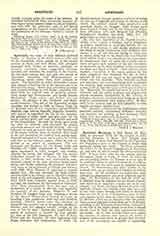

Apostolici, the name of four different heretical bodies. I. Heretics of the third century.—The sect of the Encratites, which sprang up in the second century in Syria and Asia Minor, with principles borrowed from Tatian or Marcion, practiced an excessive asceticism which exaggerated Christian morality and distorted the teaching of the Church. By the third century they had split into groups of Apostolici, Apotactici, and Hydroparastates or Aquarians, names taken from their customs or tenets. The Apostolici so styled themselves because they claimed to lead the life of the Apostles and to be derived from them. Hence they proscribed marriage and property-holding as evil things, admitting into their body no married men or property owners. They lapsed into Novatianism, and finally became Manichaeans. Their names and leaders are not known. II. Heretics of the Thirteenth and Fourteenth Centuries.—The sect of the Apostolics, or false Apostles, was started in 1260, at Parma, Italy, by an ignorant man of low extraction named Gerard Segarelli (also written Segalelli, Sagarelli, Cicarelli), who strove to reproduce the life of the Apostles. He adopted a white cloak and grey robe, let his beard and hair grow, and wore the sandals and cord of the Franciscans. He sold his house, gave away the price he received, and traversed the streets preaching penance and Apostolic poverty. He had followers to such an extent that in 1287 the Council of Wurzburg forbade them to continue their mode of life and prohibited the faithful from aiding them. Segarelli remained at Parma, was in prison for awhile, and then in the bishop’s palace, where he was regarded as an object of amusement. The sect increased, and Honorius IV (March 11, 1286) and Nicholas IV (1290) condemned it. Segarelli was again imprisoned in 1294, escaped, was retaken, abjured his errors, but relapsed, and the secular authorities burned him at Parma, July 18, 1300. Dulcin, a bold, mediocre, and unscrupulous man, assumed control of the false Apostles, issued manifestos, and finally collecting his partisans withdrew with them to the mountains of Vercelli and Novara, until 1306, when Clement V organized a crusade against him. He was captured, his body broken and delivered to the flames, and his disciples crushed. Some of the sect appeared, however, in Spain, 1315; John XXII took measures against them in 1318, and they are mentioned by the Council of Narbonne, 1374. Their characteristic from the start was a declaration of a return to the life, and especially the poverty, of the Apostles. Honorius IV and Nicholas IV charged them with violating a decree of the Second Ecumenical Council of Lyons in founding a new mendicant order and with heretical teaching. Dulcin’s tenets were: the imitation of Apostolic life; poverty was to be absolute, obedience, interior; and one engaged himself, though by no vow, to live by alms. Dulcin also taught that the course of humanity is marked by four periods: (I) that of the Old Testament; (2) that of Jesus Christ and the Apostles; (3) that beginning with Popes Sylvester and Constantine, in which the Church declined through ambition and love of riehet (4) the era of Segarelli and Dulcin, to the end of the world. He uttered several. false. prophecies. and professed liberty of thought. Free morals have been imputed to this sect by the Franciscan Salimbene (Chronica, 117) and Bernard Gui (Practica inquisitionis heretics pravitatis, 339) but the papal bulls are silent on this head.
The New Apostolici of the Twelfth Century, chiefly in the vicinity of Cologne, and at Perigueux, in France, permitted no marriage; forbade the use of flesh meat, because it and similar products were the result of sexual intercourse; they explained that sinners (i.e. all who did not belong to their sect, in which alone was to be found the true Church) could neither receive nor administer the sacraments. In consequence they set aside the. Catholic priesthood and gave each member of the `sect the power to consecrate at his daily mealtime and so: to receive the Body and Blood of Christ. “They rejected infant baptism, veneration of the saints, prayers for the dead, purgatory, and disdained the use of oaths; because all this was not found in the teaching of Christ and the Apostles. “Their external conduct was blameless, but notwithstanding their reputation for chastity, their community life with women was a clear proof of their deceptive and dangerous character. Meanwhile the people had come to know their character and the public aversion and disgust constantly increased, particularly in the vicinity of Cologne, where two members after being given three days for consideration were burned alive. St. Bernard in his sermon calls on civil authority to take regular procedure against them.
Apostolici, a branch of the Anabaptists, which practiced poverty, interpreted Scripture literally; and declared the washing of ‘feet ‘necessary, from which they were called also Pedonites.
JOHN J. A’BECKET

